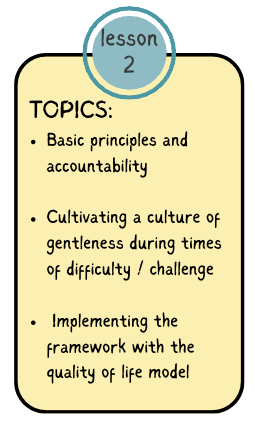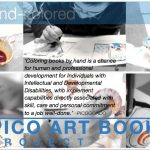 Woven into the foundation for Navigating the Heart are the principles, practices, and the promise of Gentle Teaching. This relationship-building framework is based on a psychology of interdependence. It supports the mapping out of the course and the collaborative (the Individual with their support person) navigating of its heart-centered direction for quality-of-life outcomes.
Woven into the foundation for Navigating the Heart are the principles, practices, and the promise of Gentle Teaching. This relationship-building framework is based on a psychology of interdependence. It supports the mapping out of the course and the collaborative (the Individual with their support person) navigating of its heart-centered direction for quality-of-life outcomes.
A Gentle Teaching framework uses a set of ten, quality-of-life values to address the core of meaning and value in one‘s life. ‘Valuing‘ is rooted in the foundation of social-emotional learning and in the subsequent producing of all “self“ images or concepts (self-worth, self-respect, self-determination, etc.). Connections (not corrections) are made and processed at this foundational, “core“ level of one‘s existence that inherently reaches for coherence (aka wholeness or well-being).
A practice of Gentle Teaching is the heartbeat for navigating this inward landscape. Behavior is the observable part, yet not separate from the inward landscape that it mirrors. Behavior is typically symptomatic or reflective of this foundational, “I exist“ core that is anchored by meaning and value. Connectedness is fundamental.
The four pillars of Gentle Teaching address social-emotional awareness and development that begins with the heart of human existence: the need to feel safe and loved. This in an essential, grounding element for a sense of belonging and for one’s self-awareness and growth. This ‘heart’ of one’s existence shelters the sense of ‘being and becoming human,’* harboring moral memory for destinations that can expand (or diminish) one’s awareness and continued learning to not only feel ‘safe and loved,’ but also to ‘feel loving and engaged.’ With Navigating the Heart, we continuously shift and move awareness and learning in the direction of Gentle Teaching, maintaining the relationships and the connections that support this social-emotional, ‘core’ foundation.
[*Vanier, J. (1998). Becoming Human, Toronto, Canada: Paulist Press.]
Reciprocation is something we talk about in mentoring a spirit of gentleness. What does it mean and why does it matter? The foundational focus of the quality-of-life services is to build relationships that cultivate companionship and a sense of community. Reciprocation is a quality-of-life outcome of this relationship-building goal.
Mentoring involves valuing, teaching, and protecting the Individual. It also means that we practice reciprocation by expressing reciprocal values of safe, loved, loving, and engaged, the four pillars of what we are teaching.
 Reciprocation by the Individual is a reflection of our teaching. It is what the Individual gives back as a result of our mentoring. Mentoring a spirit of gentleness nurtures the unconditional valuing of one another. It says to the Individual, ‘you exist; you matter; I’m here to listen and learn with you; to take this journey of gentleness together; to walk this path that is a space for you to be safe and loved; a culture of gentleness is an environment where you can discover more of what you can be and become.’
Reciprocation by the Individual is a reflection of our teaching. It is what the Individual gives back as a result of our mentoring. Mentoring a spirit of gentleness nurtures the unconditional valuing of one another. It says to the Individual, ‘you exist; you matter; I’m here to listen and learn with you; to take this journey of gentleness together; to walk this path that is a space for you to be safe and loved; a culture of gentleness is an environment where you can discover more of what you can be and become.’
The experiential learning about oneself as unconditionally acknowledged and accepted alters one’s sense of self and identity in profound ways. The caregiver’s primary task focuses on the valuing of who this person/Individual is through a quality-of-life lens, and how to remove and overcome barriers that distance the Individual from experiencing valuing. Reciprocation by the Individual can take many forms. It can be the individual showing the valuing of him/herself and others (relationships) and/or the valuing of the learning processes as shared experiences, or the sense of companionship and community expanding in trust and meaning for one’s life. Every one of us has unique value. When nurtured, each one’s gifts are encouraged to surface and unfold in the reciprocal spaces of relationship-building.
 In mentoring a spirit of gentleness, we reflect on how can we cultivate companionship and support the formation of community. Valuing is at the heart of mentoring work that begins with valuing ourselves and our own possibilities for learning and growth. Mentoring another or groups of others involves deep listening, setting goals, and creating plans that provide imagination, structure, and the challenge for expansion. We’ll discuss the caregiving/mentoring role and the various ways we can create dialogue and interactions that give direction and momentum to community formation. As new applications and approaches are applied and take root, new moral memory invites reciprocation, further discovery and growth. As the mentoring processes become replicated with others, collaborative connections can expand within the community.
In mentoring a spirit of gentleness, we reflect on how can we cultivate companionship and support the formation of community. Valuing is at the heart of mentoring work that begins with valuing ourselves and our own possibilities for learning and growth. Mentoring another or groups of others involves deep listening, setting goals, and creating plans that provide imagination, structure, and the challenge for expansion. We’ll discuss the caregiving/mentoring role and the various ways we can create dialogue and interactions that give direction and momentum to community formation. As new applications and approaches are applied and take root, new moral memory invites reciprocation, further discovery and growth. As the mentoring processes become replicated with others, collaborative connections can expand within the community.




